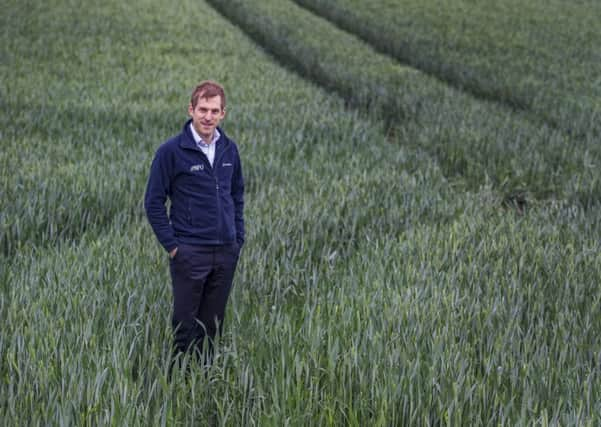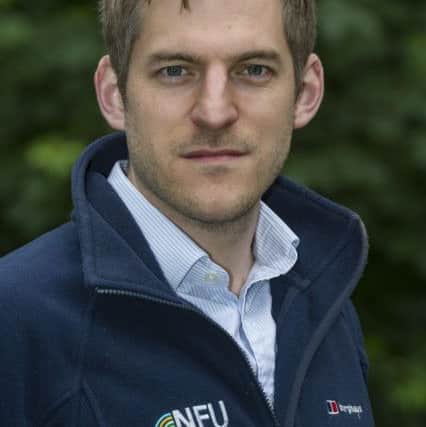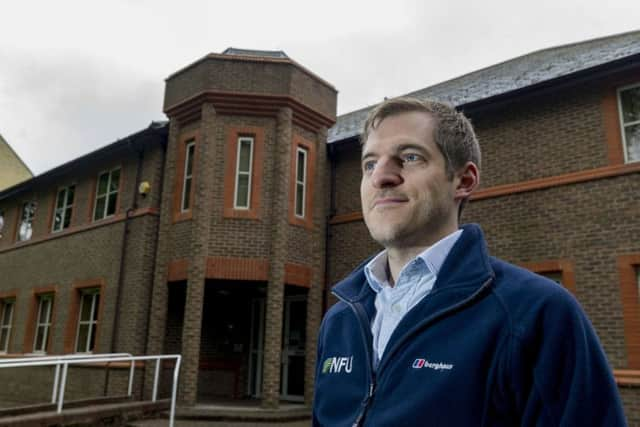Yorkshire's new union chief '˜up for the challenge'


What was your route into agriculture?
I am not from a farming family background but I had an uncle who was a shepherd on a hill farm and when I was in school I was interested in agriculture because I delivered milk.
I worked for the milkman who delivered milk to our house and I delivered milk for him before school. I did that for a long time and then ended up delivering it myself when he needed time off on the farm.


Advertisement
Hide AdAdvertisement
Hide AdI did that and was interested in agriculture and I wanted to do some practical farming, so after we delivered milk on a Saturday morning I used to work on the farm on the Saturday afternoon.
He wasn’t a dairy farmer, he was a sheep farmer and he used to buy his milk from Denby Dale.
So I got interested that way and then wanted to get out onto farms. I wasn’t particularly interested or very good with agricultural machinery so I thought the best way to get out to farms would be to be able to shear sheep. So I did a shearing course and started to do that.
That was my route into agriculture and then I went to Askham Bryan College in 2003 and did a degree there for three years and then a masters in rural development at Newcastle, then NFU.


I’m a bit out of practice with sheep shearing now though.
Advertisement
Hide AdAdvertisement
Hide AdYou arrive in your new role after years of work in the NFU, please tell us more.
I started working for the NFU in 2007 and worked down in Devon for six months. Then I worked in NFU headquarters on dairy issues and then covered arable, horticulture and poultry in the North West for two years.
It was two years on dairy and livestock issues here after that, four years in Brussels and now I am back.


So what motivated you to take this position at the NFU’s regional base in York?
Advertisement
Hide AdAdvertisement
Hide AdIt’s where I’m from to start with. It’s my home patch. I am obviously biased because I’m from here but I just think in agriculture terms, it’s just a brilliant region. I don’t think any other regions can say this properly - we actually have every sector represented. We have some of the best arable farming ground in the country, some of the hardest land in the country in terms of sheep farming in the uplands, and we have got everything in between.
One of the reasons I work for NFU is to be close to the farmers on the ground and to do my level best to help them. And the way I can do that is by working closely with them and that’s what we try to do by working regionally.
With my experience of working on national and European issues, I feel my job is to put things into local context.


Farmers here are obviously operating on their own farms in their village but actually they are operating in Europe, in the world, and I think some of the problems facing farmers, price or wider volatility, a lot of it, the uncertainty comes from farmers not being able to control those things so we have to try and have an understanding of what we can control.
What is your priority as regional director?
Advertisement
Hide AdAdvertisement
Hide AdIf you speak to farmers one of the key issues at the moment is around commodity prices, and talking about volatility and uncertainty.
The problems on farms arise from uncertainty so whether that’s uncertainty about prices or uncertainty about when they will receive their Basic Payment, and around contracts and their dealings with a slaughterhouse who may well change their specifications, well-documented stuff on what retailers can decide to do, all of that can make things uncertain on farms, but farmers respond very well to signals - if they know what the market wants and what policymakers want them to do.
At the moment the signals are not that clear which makes things uncertain for farmers and they can’t plan.
In general, there is a lot of things that feel quite uncertain. Because of where we are on commodity prices, farmers are struggling to see where prices are going to go so that makes it hard to plan for things.
Advertisement
Hide AdAdvertisement
Hide AdWe have had flooding a couple of months ago so there is uncertainty there.
We cannot control these things but we can make the regulatory environment that farmers are operating in easier.
We can put pressure on the Rural Payments Agency (RPA) to make sure payments are coming out at a time they say they will and we can work with retailers and the supply chain to make sure that those relationships are beneficial to farming.
That’s a flavour of some of the work I want to be involved with.
Advertisement
Hide AdAdvertisement
Hide AdWhat we should be about is profitable, productive and progressive agriculture. Farmers need to be profitable so they can invest, create jobs, they need to be productive because we’ve got more people to feed and they need to be progressive and forward thinking.
Agriculture is very relevant to the region but it needs to be further up the agenda.
So you are optimistic about the future of farming in Yorkshire?
I am optimistic but I am also very aware of how difficult things are at the moment. But I think we have to remain optimistic because the long term trajectory for agriculture is good. But at the moment things are very difficult.
Advertisement
Hide AdAdvertisement
Hide AdWhat is your assessment of how the Rural Payments Agency performed when it delivered the first round of Basic Payment Scheme over the last year?
Not good enough. Policymakers and politicians made promises and we have been holding them to account.
Payments have improved but the problem we have had in this region, probably more than any other is that a lot of the problems around getting Basic Payments to farmers have been around common land, and because we have such a large amount of upland farming in our region we have been adversely hit - and you link that to wider commodity prices, that’s been problematic for us.
And we have been here before. I remember back in 2005 when I worked here before, we were still mopping up the problems from then.
Advertisement
Hide AdAdvertisement
Hide AdDo you expect a better performance from the RPA in the next payment round?
I sincerely hope so. I know that some of the messages from the RPA have been that we want to get payments right this year so it doesn’t have an impact on next year but the last thing I want to see is farmers in this region being in the same position when it comes to delayed payments.
As an organisation we are putting pressure on the RPA to make sure that is not the case.
Is Yorkshire in any better a position than other parts of the country to enjoy a prosperous farming future?
Advertisement
Hide AdAdvertisement
Hide AdThe benefit that we have in this region, as I have already mentioned, we have all types of agriculture, but we have huge urban populations too.
I’ve just been at Northumberland Show, it has been Open Farm Sunday, we have the Great Yorkshire Show coming up and I don’t know what the figures are in terms of people wanting to support agriculture but it is very high.
People want to support their farmers and on that basis this region has a bright future when you think about Sheffield, Leeds, where I’m from, all those people who live there who are interested in where their food is coming from. That’s why a huge number of them go to agricultural shows and want to talk to farmers and however many people are watching Countryfile on a Sunday, so on that basis I think Yorkshire is very well placed really.
One thing that I want to get my teeth into is this whole idea of a Northern Powerhouse, is that a reality? Because I sincerely hope that it is.
Advertisement
Hide AdAdvertisement
Hide AdIf it is, then agriculture and food has to be a big part of that, because it is a big part of the regional economy.
If you are looking for growth in the future there is lots of room for growth there and I would hope that it is not empty rhetoric on the Northern Powerhouse because we need more widely than agriculture to create jobs here - farming can do that if the business conditions are right.
Linked to that is the whole devolution argument, what is going to happen? Will there be more power for the regions? I think that is likely and that is something that could well have an impact on agriculture and it could, and should, be positive. But I’m not clear as yet about how that will all pan out.
At times like this farmers need a strong organisation to represent them and that is what we are here to do. We are up for the challenge.
Advertisement
Hide AdAdvertisement
Hide AdIs any one sector suffering more than others in this commodity price downturn? How can better prices be achieved?
Clearly the dairy sector has seen a sustained period of low prices, and we are seeing this across other sectors of the agricultural economy as well. A cocktail of higher production, subdued demand, a strengthening pound against the euro and a sustained period of lower farmgate prices across the sectors has led to falling profitability.
For example, Defra has released the first estimate of Total Income from Farming (TIFF) in England and the regions for 2015. TIFF in England is estimated to have fallen between 2014-15 by 31 per cent - a significant reduction and we are seeing this in practical reality on farms across the region.
Prices of commodities are dictated by the market, but there is a lot to be done on issues which affect that market– be that around boosting consumption of British products, making sure that the supply chain is fair to all by boosting transparency and creating better contractual relations or making legislative and regulatory changes which boost farm business profitability.
Advertisement
Hide AdAdvertisement
Hide AdThe Yorkshire Post’s Clearly British campaign calls on retailers, food processors and the wider food industry to clearly label all dairy products with origin labelling. Is this something you want to see?
We fully support any campaign which makes it easier and simpler for British consumers to support British farmers, and NFU actively campaign for mandatory county of origin labelling. Food labelling is notoriously complicated, and anything which helps consumers to make decisions for the benefit of British farming when they are buying food is to be welcomed.
Retailers tend to be blamed for letting farmers down with low prices at the farm gates. Is this fair?
It’s a complicated picture. We are in the middle of a significant price downturn in the farming sector, at the same time as the supermarkets are ripping shreds from each other in order to keep on to market share as discount retailers have entered the market. As an organisation, we are strident in our criticism of supermarkets when we believe they have behaved badly, and we will equally praise supermarkets when they do good things to support British agriculture. The food chain – from farm to processor to retailer and consumer is far from perfect, and our job is to continue to bang the drum for British farmers and to continue to make it clear that a food chain fair for everyone makes business sense.
Advertisement
Hide AdAdvertisement
Hide AdThe Government’s 25-year Food and Farming plan has been delayed. How important is it for a long-term view for the industry to be put on the table?
It’s extremely important. Farming is a long term game, farm businesses need to plan and farmers respond well to signals.
At a time of economic and political uncertainty like farmers are experiencing at present, a long term vision for farming and food from Government is needed now more than ever.
LARGE AREA OF RESPONSIBILITY
As regional director for the North East region, Adam Bedford is responsible for supporting and championing NFU members across Yorkshire, Durham, Tyne and Wear and Northumberland.
Advertisement
Hide AdAdvertisement
Hide AdSuch a large area involves hugely diverse farm land where small family farms still predominate.
Huddersfield-born Mr Bedford’s first role with the NFU was as a graduate trainee in 2007. This allowed him to spend time at NFU Headquarters in Warwickshire and work with the North West team for a spell before joining NFU North East in 2010 as senior policy adviser.
He moved to Brussels in 2012 and became director of the British Agriculture Bureau – the union’s permanent office in Brussels, three years later.